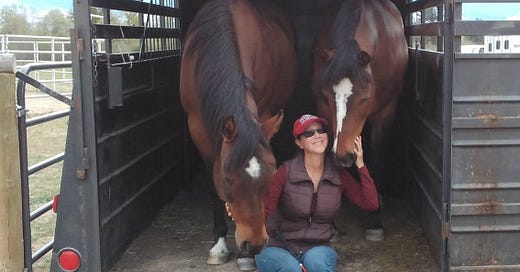No Problem, Horses, Only Problem People
Okay, well, this is a joke — mostly. Some of the ways in which people train horses are problematic, FOR SURE! There is a long list of the ways in which this is the case that I will not cover in this article. What I will cover is problem people. What do I mean by problem people?
Problem people are, generally speaking, people who think like people and who do not think like a horse. They have a tendency to solve their “horse problems” using human psychology instead of equine psychology.
Here is a common example: trailer loading an unconfident horse. A person who uses human psychology to get a horse into a trailer might punish the horse by backing them up rudely, get ten of their friends and a long butt rope to push the horse into the trailer, or get a winch and literally drag the horse in. (Yup, seen all of these happen) None of these so-called solutions uses horse psychology or thinking like a horse. Horses are fearful of tight spaces and traps. Humans are adept at setting traps, capturing their prey in tight spaces, and often, eating that prey.
So, how does a fearful horse know that someone trying to force them into a horse trailer is not a trap? They don’t know, is the answer. Until they are shown. A human who thinks like a horse in this situation will give the horse comfort when they are near and thinking about the trailer, and they will apply some pressure when the horse thinks or goes elsewhere. It’s as simple as that — usually. They will also allow a confined, scared-feeling horse the ability to escape if they need to.
But the one thing that often happens, especially during trailer loading, is that people either don’t prepare their horses enough ahead of time or they give up in the middle of the session and lose their patience. The last time I checked, horses do not wear watches, and since prey animals make big money outwitting predators, they can often outwait us, thus eluding what they often perceive as capture.
A true horseperson, i.e., one who thinks about what is important to horses, takes the appropriate amount of time to teach the horse what to do instead of forcing a horse to do something, keeping in mind that a forced horse is not a confident one and never will be. So, the next time you see someone training a horse or interacting with their horse, ask yourself if they are teaching them in the way a horse would understand or the way a human would, because there is a big difference.
(Sidenote: The woman depicted in this photo is in no way a problem person. The photo is being used to show how good horse people use psychology instead of force to load horses into trailers.)
If you enjoyed this article, please share it with your friends. Also, please consider supporting our work by getting a paid subscription. Thank you, Lorri and Ethan





